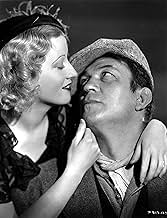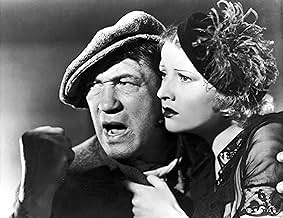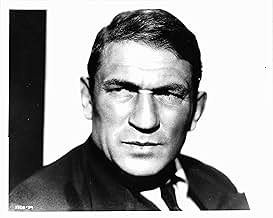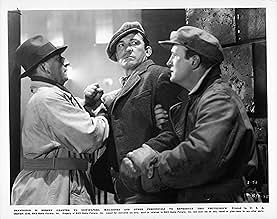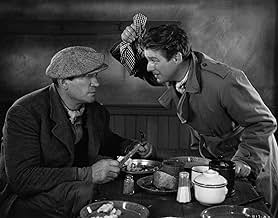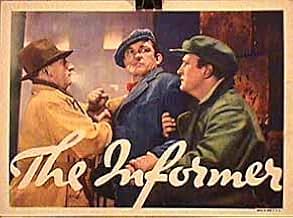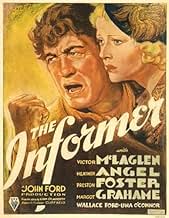AVALIAÇÃO DA IMDb
7,3/10
7,6 mil
SUA AVALIAÇÃO
Adicionar um enredo no seu idiomaIn 1922, an Irish rebel informs on his friend, then feels doom closing in.In 1922, an Irish rebel informs on his friend, then feels doom closing in.In 1922, an Irish rebel informs on his friend, then feels doom closing in.
- Direção
- Roteiristas
- Artistas
- Ganhou 4 Oscars
- 13 vitórias e 4 indicações no total
Joe Sawyer
- Barty Mulholland
- (as Joseph Sauers)
Steve Pendleton
- Dennis Daly
- (as Gaylord Pendleton)
Denis O'Dea
- Street Singer
- (as Dennis O'Dea)
Frank Baker
- Small Role
- (não creditado)
- Direção
- Roteiristas
- Elenco e equipe completos
- Produção, bilheteria e muito mais no IMDbPro
Avaliações em destaque
A lot of movies of John Ford (Sean O'Feeney) deal with Ireland.At every stage of a long and brilliant career,he gets back to his roots in his homeland:"the informer" and "the plough and the stars" are early period;"the quiet man " is middle, "young Cassidy" is late.
Far from being "one of the worst movies of the thirties" ,"the informer " belongs to its time:that's true that the studios deny realism but that was true for Fritz Lang's "M" and Marcel Carné's "réalisme poétique" too.Anyway,at a pinch,no matter if it's a political subject in the Ireland of the twenties:what Ford has to say to us is universal:when a man betrays his best friend,be it for thirty coins of silver or for twenty quids,he will be eaten with remorse ,everything that he'll see and hear will remember him of the awful thing he's done.Gypo won't take advantage of his pitiful reward,he will loose everything except the victim's mother's compassion and forgiveness. All through this dark movie,Gypo will roam the foggy streets ,a desperate man:you should not forget that he is an outcast from the beginning:dismissed by the IRA,because he hadn't guts enough to kill a prisoner,and outside a girl,and Jackie (the man he will betray),he's on his own ,a man who suffers from hunger and,worse, lack of self-esteem -the one time when he finds solace is when he has a rest near his girl's fireplace-This character is not that much far from Peter Lorre's part in "M":both movies feature a secret trial.
As always in Ford's cinema,women are figures of peace love and understanding,and for them a man can always redeem his soul: here Katie and the mother.In "quiet man" ,Wayne is given a second chance thanks to Ireland and... Maureen O'Hara.And after all Ford's last movie will be "seven women" (1966) :a doctor(Ann Bancroft) will triumph over barbary against all odds.
Far from being "one of the worst movies of the thirties" ,"the informer " belongs to its time:that's true that the studios deny realism but that was true for Fritz Lang's "M" and Marcel Carné's "réalisme poétique" too.Anyway,at a pinch,no matter if it's a political subject in the Ireland of the twenties:what Ford has to say to us is universal:when a man betrays his best friend,be it for thirty coins of silver or for twenty quids,he will be eaten with remorse ,everything that he'll see and hear will remember him of the awful thing he's done.Gypo won't take advantage of his pitiful reward,he will loose everything except the victim's mother's compassion and forgiveness. All through this dark movie,Gypo will roam the foggy streets ,a desperate man:you should not forget that he is an outcast from the beginning:dismissed by the IRA,because he hadn't guts enough to kill a prisoner,and outside a girl,and Jackie (the man he will betray),he's on his own ,a man who suffers from hunger and,worse, lack of self-esteem -the one time when he finds solace is when he has a rest near his girl's fireplace-This character is not that much far from Peter Lorre's part in "M":both movies feature a secret trial.
As always in Ford's cinema,women are figures of peace love and understanding,and for them a man can always redeem his soul: here Katie and the mother.In "quiet man" ,Wayne is given a second chance thanks to Ireland and... Maureen O'Hara.And after all Ford's last movie will be "seven women" (1966) :a doctor(Ann Bancroft) will triumph over barbary against all odds.
I don't doubt that Victor McLaglen won his Best Actor Oscar for this film by dint of a three way split among the Mutiny on the Bounty leads of Clark Gable, Charles Laughton, and Franchot Tone who were all in the same race. But The Informer is still a fine film because John Ford wouldn't have gotten his first Best Director Oscar if it wasn't. No split involved in his award.
The movie and the story by Liam O'Flaherty that it is based on involves a poor simpleton of a man named Gypo Nolan who was once a member of the Irish Republican Army. He was cashiered out of it for some imbecilic stunt he pulled and wants back in. He's down to his last pence and if he can't get back in, wants enough for passage to America. There's a twenty pound reward for information leading to the arrest of a former comrade named Frankie McPhillip played by Wallace Ford. In a moment of weakness he goes to the Black and Tan constabulary and informs on McPhillip.
The IRA is pretty anxious to find out who ratted McPhillip out and they're pretty certain it was McLaglen. He hasn't the wit to really cover his own tracks. He does make a feeble effort to implicate another man named Peter Mulligan played by Donald Meek. He also picks up a hanger-on played by J.M. Kerrigan.
The whole action of The Informer takes place in 1922 in Dublin from about six in the evening to early the following morning. Of a necessity it is shot in darkness and shadows, making it possibly the first noir thriller. Had it been done post World War II The Informer would have ranked as a great noir classic, like Odd Man Out or the The Third Man which it bares a lot of resemblance to.
John Ford knew this world very well. He took some time off during the Rebellion and was in Ireland at the time and had a brother who was in the IRA. His real name before having it anglicized was Sean O'Fiernan.
Preston Foster plays the IRA commandant Dan Gallagher. In the book Gallagher is a harder and meaner man than Foster has him here. My guess is that John Ford wanted him as a sympathetic character to give movie fans some rooting interest. He makes it clear that Foster has to eliminate the informer because the Black and Tans will grab him and get quite a bit more out of him and put the whole organization in peril.
The IRA trial scene is the highlight of the film. When Foster asks Donald Meek whether he recognizes the authority of their court, Meek ain't in a position to say no. The King's justice and writ does not run here. It graphically illustrates at that point despite occupation by army troops and constabulary, the British are indeed losing their grip on the population.
Of course The Informer a rather grim story has its John Ford touches, but rather fewer than you would expect. Even as McLaglen is spending his money on a drunken spree, the IRA is constantly in the shadows watching him and counting every farthing.
The Informer is a tale well told about Ireland in a grim and dismal time.
The movie and the story by Liam O'Flaherty that it is based on involves a poor simpleton of a man named Gypo Nolan who was once a member of the Irish Republican Army. He was cashiered out of it for some imbecilic stunt he pulled and wants back in. He's down to his last pence and if he can't get back in, wants enough for passage to America. There's a twenty pound reward for information leading to the arrest of a former comrade named Frankie McPhillip played by Wallace Ford. In a moment of weakness he goes to the Black and Tan constabulary and informs on McPhillip.
The IRA is pretty anxious to find out who ratted McPhillip out and they're pretty certain it was McLaglen. He hasn't the wit to really cover his own tracks. He does make a feeble effort to implicate another man named Peter Mulligan played by Donald Meek. He also picks up a hanger-on played by J.M. Kerrigan.
The whole action of The Informer takes place in 1922 in Dublin from about six in the evening to early the following morning. Of a necessity it is shot in darkness and shadows, making it possibly the first noir thriller. Had it been done post World War II The Informer would have ranked as a great noir classic, like Odd Man Out or the The Third Man which it bares a lot of resemblance to.
John Ford knew this world very well. He took some time off during the Rebellion and was in Ireland at the time and had a brother who was in the IRA. His real name before having it anglicized was Sean O'Fiernan.
Preston Foster plays the IRA commandant Dan Gallagher. In the book Gallagher is a harder and meaner man than Foster has him here. My guess is that John Ford wanted him as a sympathetic character to give movie fans some rooting interest. He makes it clear that Foster has to eliminate the informer because the Black and Tans will grab him and get quite a bit more out of him and put the whole organization in peril.
The IRA trial scene is the highlight of the film. When Foster asks Donald Meek whether he recognizes the authority of their court, Meek ain't in a position to say no. The King's justice and writ does not run here. It graphically illustrates at that point despite occupation by army troops and constabulary, the British are indeed losing their grip on the population.
Of course The Informer a rather grim story has its John Ford touches, but rather fewer than you would expect. Even as McLaglen is spending his money on a drunken spree, the IRA is constantly in the shadows watching him and counting every farthing.
The Informer is a tale well told about Ireland in a grim and dismal time.
Dublin, 1922 . Gypo Nolan (Victor McLagen) , a slow-witted Irish pug has been ousted from the rebel organization . He is hungry and attempts to impress his ladylove . When he finds that his equally destitute girlfriend Katie Madden (Margot Grahame) has been reduced to prostitution , he succumbs to temptation and turns his friend Frankie McPhillip (Wallace Ford) in for money to the British authorities for a 20 pound reward . Nolan then feels doom closing in . He also gets his comeuppance from the IRA (whose leader is Preston Foster) . Later on , Gypo gets home Mrs. McPhillip (Una O'Connor) and Mary McPhillip (Heather Angel) .
Intense film about loneliness , suspicion , frightening , treason , information ; and including a descriptive, evocative black-and-white cinematography . This is a dramatic film dealing with thought-provoking themes about betrayal , guilt and retribution . John Ford re-made "The Informer" (1929) by Arthur Robinson ; and , obviously, he was influenced by this version . Good acting by Victor Mclagen as a strong but none too bright man who betrays his former comrade , though overacting and bears excessive gesticulation . The day before shooting McLagen's trial scene , he proceeded to go out drinking - which Ford knew he would do - and the next day was forced to film the scene with a terrible hangover, which was just the effect Ford wanted . John Ford had been highly impressed by F.W. Murnau's ¨Sunrise¨ and wanted to bring an element of German Expressionism to this film . As it displays an expressionist cinematography by Joseph M August , plenty if lights and dark , being well showed in the course of one gloomy , foggy night . Interesting screenplay by Dudley Nichols who wrote the script in six days , being based from the story by Liam O'Flaherty .
This was the first of RKO's three-picture deal with director John Ford and despite its deserved reputation and multiple Oscars, it was a low budget production . Another reason why RKO was reluctant to make the film was because a version of the story had already been filmed in the UK in 1929 .Initially a box office failure, the film made millions when it was re-released after its multiple wins at the Academy Awards .Shot in 17 days and its production costs came to a mere $243,000 . The picture belongs the Ford's second period -subsequently his silent time-when John Ford (1895-1973) made a rich variety of stories and his reputation rightly rests on his work in the 30s and 1940s, as ¨Grapes of wrath¨ , ¨How green was my valley¨ , ¨Fugitive¨ , ¨They were expendable¨, ¨My darling Clementine¨ and the Cavalry trilogy
Intense film about loneliness , suspicion , frightening , treason , information ; and including a descriptive, evocative black-and-white cinematography . This is a dramatic film dealing with thought-provoking themes about betrayal , guilt and retribution . John Ford re-made "The Informer" (1929) by Arthur Robinson ; and , obviously, he was influenced by this version . Good acting by Victor Mclagen as a strong but none too bright man who betrays his former comrade , though overacting and bears excessive gesticulation . The day before shooting McLagen's trial scene , he proceeded to go out drinking - which Ford knew he would do - and the next day was forced to film the scene with a terrible hangover, which was just the effect Ford wanted . John Ford had been highly impressed by F.W. Murnau's ¨Sunrise¨ and wanted to bring an element of German Expressionism to this film . As it displays an expressionist cinematography by Joseph M August , plenty if lights and dark , being well showed in the course of one gloomy , foggy night . Interesting screenplay by Dudley Nichols who wrote the script in six days , being based from the story by Liam O'Flaherty .
This was the first of RKO's three-picture deal with director John Ford and despite its deserved reputation and multiple Oscars, it was a low budget production . Another reason why RKO was reluctant to make the film was because a version of the story had already been filmed in the UK in 1929 .Initially a box office failure, the film made millions when it was re-released after its multiple wins at the Academy Awards .Shot in 17 days and its production costs came to a mere $243,000 . The picture belongs the Ford's second period -subsequently his silent time-when John Ford (1895-1973) made a rich variety of stories and his reputation rightly rests on his work in the 30s and 1940s, as ¨Grapes of wrath¨ , ¨How green was my valley¨ , ¨Fugitive¨ , ¨They were expendable¨, ¨My darling Clementine¨ and the Cavalry trilogy
A brilliant portrait of a traitor (Victor McLaglen in Oscar winning performance) who is hounded by his own conscience. McLaglen plays an IRA rouge who betrays his leader to collect a reward during Ireland's Sinn Fein Rebellion. The scenes showing fights and mob actions are very realistic, focusing on the desperation within individuals. The lack of hope for a better future seems to be a fate worse than death.
Director John Ford superbly creates an murky and tense atmosphere, enhanced by the foggy and grimy depiction of the Irish landscape. Max Steiner's dramatic music score adds to the cinematic delight. Oscar Winner also for Best Screenplay, nominated for Best Picture. This is one of Hollywood's Classic.
Director John Ford superbly creates an murky and tense atmosphere, enhanced by the foggy and grimy depiction of the Irish landscape. Max Steiner's dramatic music score adds to the cinematic delight. Oscar Winner also for Best Screenplay, nominated for Best Picture. This is one of Hollywood's Classic.
Victor McLaglen, the title character of John Ford's THE INFORMER, reminded me of the circus man from Fellini's LA STRADA. Anthony Quinn played the brutish man, who may have even been influenced by the pug-faced, Oscar-winning performance given by McLaglen. Poverty-stricken Dublin is the true-life, atmospheric setting of the picture, which takes place in 1922. Dense fog and a long damp night are the main elements of a story about deep Irish patriotism and the fight of the Irish Republican Army. The conflict of individuality and the cause is what makes THE INFORMER tick. McLaglen's large, simple character just wants to go to America and we're reminded by signs of the price for a ticket frequently. Two different signs become the psychological centerpiece for the drunken Irishman. One is the previous, the other a WANTED sign. Should he do it and get the money to go?
John Ford once famously said, "My name is Ford. I make Westerns." After seeing this film, he obviously could do a heck of a lot more. The serious social issues dealt with here are heartfelt and ones you will find yourself thinking about. And the look of the piece is amazing, consisting of long dark shadows cutting into a miserable Ireland night. Ford was always known for his luminescent, gorgeous cinematography that helped to foresee the conflicts within his characters. This is hard in color, but he did it in pictures like THE SEARCHERS, painting John Wayne in a sometimes vicious manner. Victor McLaglen's performance not only benefits from the lighting, but by the sheer simplicity of his acting. He shoves a lot. He knocks people out. He is a brute who knows no better. He should, however, know whether or not to cross the IRA.
See the film to find out the gritty details. See it also for McLaglen and Ford's patriotic portrayal of the IRA. Max Steiner's score is innovative in how it matches gestures of the characters, placing more emphasis on them. This was usually only seen in silent films, especially Chaplin. The topic of naming names or "informing" is obviously still important. Just look at how the media covered this year's Oscars, giving much attention to the Elia Kazan scandal.
John Ford once famously said, "My name is Ford. I make Westerns." After seeing this film, he obviously could do a heck of a lot more. The serious social issues dealt with here are heartfelt and ones you will find yourself thinking about. And the look of the piece is amazing, consisting of long dark shadows cutting into a miserable Ireland night. Ford was always known for his luminescent, gorgeous cinematography that helped to foresee the conflicts within his characters. This is hard in color, but he did it in pictures like THE SEARCHERS, painting John Wayne in a sometimes vicious manner. Victor McLaglen's performance not only benefits from the lighting, but by the sheer simplicity of his acting. He shoves a lot. He knocks people out. He is a brute who knows no better. He should, however, know whether or not to cross the IRA.
See the film to find out the gritty details. See it also for McLaglen and Ford's patriotic portrayal of the IRA. Max Steiner's score is innovative in how it matches gestures of the characters, placing more emphasis on them. This was usually only seen in silent films, especially Chaplin. The topic of naming names or "informing" is obviously still important. Just look at how the media covered this year's Oscars, giving much attention to the Elia Kazan scandal.
Você sabia?
- CuriosidadesJohn Ford kept Victor McLaglen continually off-balance (and thus in character) by getting him drunk, changing his schedules, verbally abusing him on and off the set and filming scenes when he'd told McLaglen that they were only rehearsing. For the crucial rebel court scene, the story goes that Ford reduced the actor to a trembling wreck by promising him the day off only to bring him into the studio early and extremely hung over, insisting that he spit out his lines. McLaglen was so furious with Ford over this that he threatened to quit acting and kill the director.
- Erros de gravaçãoFrankie McPhillip tells his mother he travelled to her house via O'Connell Street. In 1922, the year the movie is set, O'Connell Street was still offically called Sackville Street, but the Irish Home Rule Party had unsuccessfully attempted to change it to "O'Connell Street" prior to this and this name was commonly used by nationalist Dubliners.
- Citações
Gypo Nolan: And now the British think I'm with the Irish, and the Irish think I'm with the British. The long and short of it is I'm walkin' around without a dog to lick my trousers!
- Cenas durante ou pós-créditosOpening credits prologue: 1920 "Then Judas repented himself-and cast down the thirty pieces of silver - and departed."
- Versões alternativasSince its original release, the UK prints of this film have omitted all references to the IRA, but a 1998 release on a budget video label restored these cuts.
- ConexõesFeatured in Dirigido por John Ford (1971)
Principais escolhas
Faça login para avaliar e ver a lista de recomendações personalizadas
- How long is The Informer?Fornecido pela Alexa
Detalhes
- Data de lançamento
- País de origem
- Idioma
- Também conhecido como
- The Informer
- Locações de filme
- Empresa de produção
- Consulte mais créditos da empresa na IMDbPro
Bilheteria
- Orçamento
- US$ 243.000 (estimativa)
- Tempo de duração1 hora 31 minutos
- Cor
- Proporção
- 1.37 : 1
Contribua para esta página
Sugerir uma alteração ou adicionar conteúdo ausente



